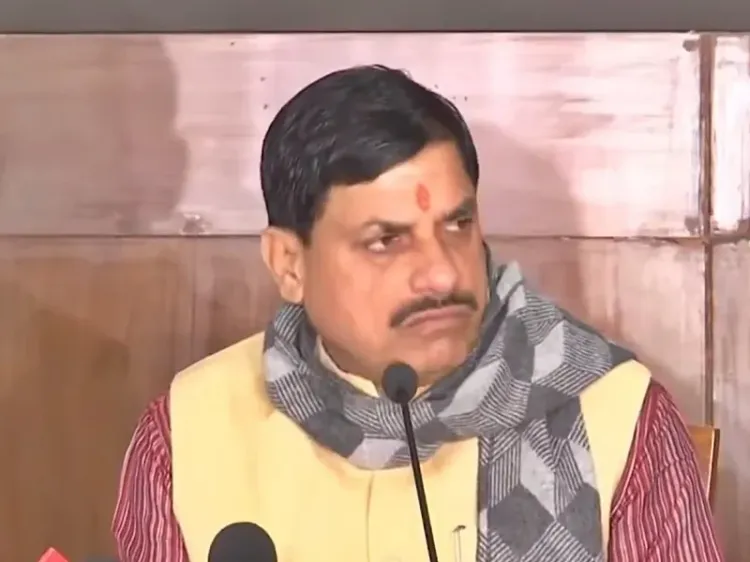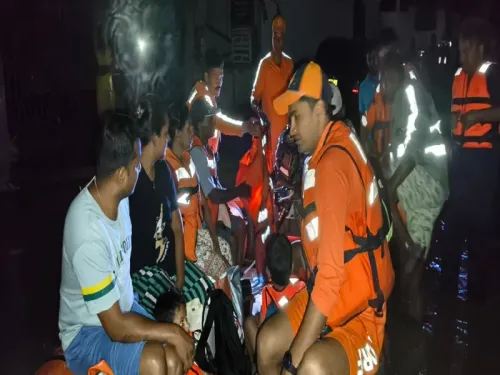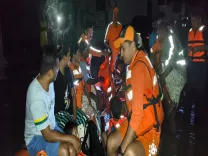Mohan Yadav Calls for Political Neutrality Over Bhopal Gas Tragedy Waste Management Amid Protests

Bhopal, Jan 2 (NationPress) Madhya Pradesh Chief Minister Mohan Yadav urged that there must be no political agendas concerning the relocation of hazardous chemical waste from the site of the 1984 Bhopal gas tragedy to the Pithampur dumping ground, emphasizing that all official and environmental standards are being rigorously followed for the safe transfer and disposal of the toxic waste.
The Chief Minister's request arose amid concerns and objections raised by a coalition of activists, local residents of Pithampur, and school children who staged a protest against the relocation of the hazardous materials.
Reports indicate that local politicians from various parties have also expressed their support for the protest, calling for a 'Pithampur shutdown' on Friday.
A delegation of activists is expected to travel to Bhopal to meet with Chief Minister Mohan Yadav to voice their concerns regarding this issue. Sources have informed IANS that senior BJP leader and minister Kailash Vijayvargiya met with the protesters at Pithampur in an effort to persuade them to conclude their demonstration on Thursday.
In the meantime, Chief Minister Mohan Yadav, speaking at a press conference in Bhopal, assured that the chemical waste being transferred from the Union Carbide factory will be disposed of following all environmental regulations, asserting that this issue should remain free from political influence.
"The disposal of hazardous waste is being conducted in accordance with the directives of the Supreme Court and High Court after evaluating the findings of a trial disposal conducted in 2015, which was deemed harmless. The people of Bhopal have received significant relief from this development, and political interference should not occur," CM Yadav stated.
The state government reiterated that the Pithampur facility is specifically engineered for the secure incineration of waste produced by industrial entities throughout the state. In 2015, a trial run for the disposal of 10 metric tonnes of waste from the Union Carbide India Limited (UCIL) was executed under the supervision of the Central Pollution Control Board (CPCB), adhering to all required safety protocols.
Moreover, it was noted that the advanced treatment, storage, and disposal facility (TSDF) in Pithampur has been safely incinerating waste from various organizations since 2006, similar to the storage and operational practices at UCIL.
Director of the Bhopal Gas Tragedy Relief and Rehabilitation department, Swatantra Kumar Singh, stated that following the 2015 trial run of UCIL waste disposal, emission levels were found to be compliant with the established national standards. He noted that over the past decade, the agricultural area for soybean and wheat crops in the Pithampur vicinity has expanded.
"The results showed that no harmful substances were detected in the air or water after the disposal process. The residual materials from incineration were safely disposed of using a double composite liner system to ensure environmental safety," Swatantra Kumar Singh remarked.
Container trucks carrying 337 metric tonnes of chemical waste that departed from Bhopal late Wednesday night arrived in Pithampur early Thursday morning.
All 12 containers have been stationed at the premises of the Ramki factory located in the Ashapura area of Pithampur, Dhar district.
According to official reports, the total hazardous waste includes approximately 162 metric tonnes of soil, 92 metric tonnes of sevin and naphthol residues, 54 metric tonnes of semi-processed pesticides, and 29 metric tonnes of reactor waste.
Additionally, it contains methyl isocyanate (MIC), which is associated with the 1984 gas leak disaster.









